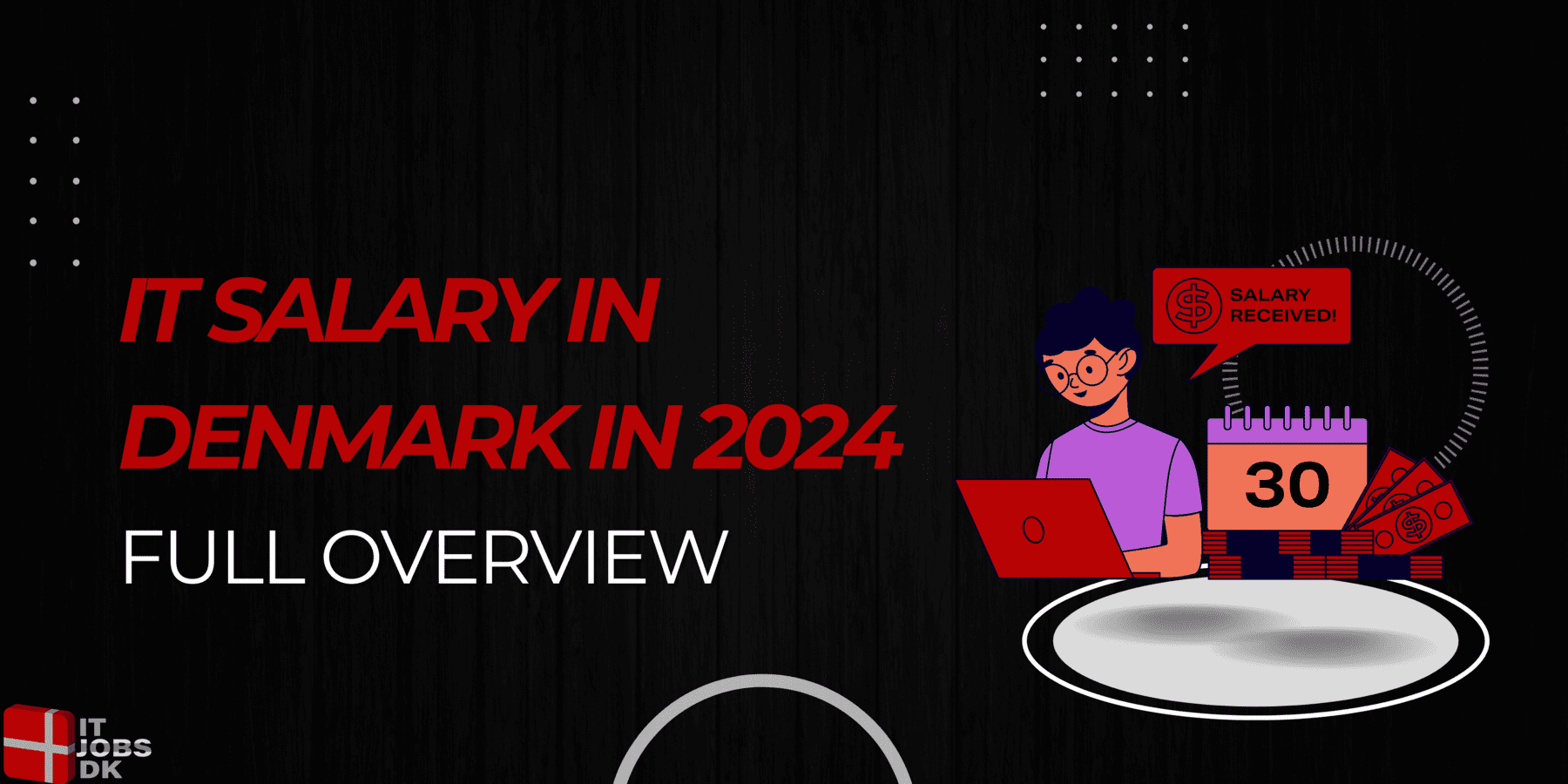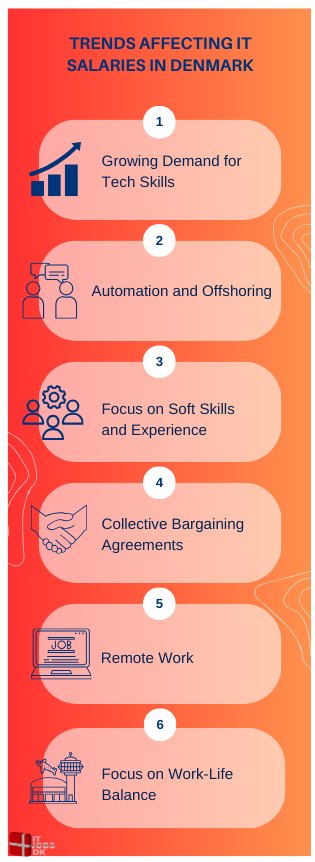
Denmark’s IT industry is integral to its economy, recognized for its innovation, excellent infrastructure, and substantial government support for technology initiatives. The country boasts a dynamic startup scene, especially in urban centers like Copenhagen and Aarhus, and has become a magnet for international tech investments.
Danish sectors, including public services, healthcare, and education, have been leaders in adopting digital solutions, further driving demand for IT expertise. This focus on technology is aligned with Denmark’s commitment to sustainability and improving quality of life, making it a pioneering hub for IT development.
IT salary in Denmark is competitive, reflecting the country’s high standard of living and the substantial demand for skilled IT workers. Software developers in Denmark typically earn a robust salary, with variations depending on their experience, specific technical skills, and the complexity of their role. IT project managers, pivotal in steering projects towards success, see salaries that often include performance-based bonuses and incentives, making their compensation particularly attractive.
Factors Influencing IT Salaries in Denmark
Denmark IT salary is influenced by a mix of factors beyond just the national averages. Here’s a breakdown of the key aspects:
Collective Bargaining Agreements:
- A major influence in Denmark is collective bargaining agreements. These agreements, negotiated between trade unions and employer organizations, set salary ranges and benefits for various IT job categories across different sectors.
Qualifications and Experience:
- Your level of education and experience significantly impact your IT salary. More specialized skills and certifications can lead to higher compensation.
Location:
- Salaries can vary depending on the region. IT professionals working in Copenhagen or other major cities might command higher salaries compared to those in rural areas.

Market Demand:
- Specific IT skills in high demand will see a corresponding increase in salary. If a particular technology or expertise is scarce, employers might offer more competitive salaries to attract talent.
Public vs. Private Sector:
- The public sector generally offers a bit more stability and benefits, while the private sector might have a higher earning potential, particularly for specialized IT roles.
These factors combine in various ways to shape the IT salary landscape in Denmark, providing a dynamic environment where skilled IT professionals can thrive.
Average Denmark IT Jobs Salary
Here are some examples of average IT salaries by role (remember these are estimates, and actual salaries can vary):
- Software Developer: DKK 44,907 per month on average, with a range of DKK 199,000 – DKK 616,000 depending on experience and skills.
- Software Engineer: Levels.fyi reports an average total salary in Denmark for engineers of DKK 660,345 per year, which translates to around DKK 55,000 per month.
- System Administrator: This role might see an average closer to DKK 40,000 per month.
- Business Analyst: DKK 44,480 per month is an example average.
- Data Analyst/Engineer: These roles can range around DKK 42,000 per month on average.
- IT Support Salary Denmark: The average salary for IT Support professionals in Denmark typically ranges from 25,000 DKK to 40,000 DKK per month.
- IT Consultant Salary Denmark: The average salary for an IT Consultant in Denmark is generally between 40,000 DKK and 70,000 DKK per month.
- IT Project Manager Salary Denmark: The average salary for IT Project Managers ranges from 50,000 DKK to 80,000 DKK per month.
- IT Manager Salary Denmark: The average salary for IT Managers in Denmark ranges from 60,000 DKK to 100,000 DKK per month.
These salaries highlight Denmark’s high standard of living and the robust demand for skilled IT professionals across multiple sectors. The roles discussed not only require a high level of technical expertise but also necessitate strong problem-solving abilities and, frequently, a deep understanding of strategic business practices. All these factors contribute to the average IT salary in Denmark, ensuring that the compensation aligns with the expertise and value provided.
This dynamic is also evident when considering the Denmark salary for IT professionals, which reflects the competitive and comprehensive remuneration typical in the Danish IT job market.
Trends Affecting IT Salaries in Denmark
The IT job market in Denmark is dynamic, and several trends are likely to influence salaries in the coming years:
Growing Demand for Tech Skills:
- Denmark, like many countries, faces a skills gap in the IT sector. The demand for qualified IT professionals is expected to continue rising, putting upward pressure on salaries, particularly for roles with specialized skills in areas like:
- Artificial intelligence (AI)
- Machine learning (ML)
- Cybersecurity
- Cloud computing
- Data science
Automation and Offshoring:
- While automation can displace some IT jobs, it can also create new ones focused on developing, managing, and maintaining automated systems. The impact on salaries might vary depending on the specific role. Offshoring of certain IT tasks to lower-cost locations could put downward pressure on salaries for some entry-level or routine IT jobs.
Focus on Soft Skills and Experience:
- Beyond technical expertise, soft skills like communication, collaboration, and problem-solving are becoming increasingly important for IT professionals. Employers might be willing to offer higher salaries to individuals who possess both strong technical skills and the ability to effectively work within teams.
- Experience remains a key factor. As experience grows, so does earning potential.

Collective Bargaining Agreements:
- These agreements between unions and employers will continue to play a significant role in setting salary floors and influencing overall trends in the IT sector.
Remote Work:
- The rise of remote work possibilities could allow IT professionals to consider opportunities beyond their immediate location, potentially increasing competition for certain roles and influencing salary offers.
Focus on Work-Life Balance:
- Denmark has a strong emphasis on work-life balance. Companies offering flexible work arrangements or attractive benefits packages might be more competitive in attracting and retaining top IT talent.
By keeping abreast of these trends, IT professionals in Denmark can more effectively position themselves to negotiate competitive wages and adapt to changes in the job market. Understanding these dynamics is crucial for anyone looking to maximize their IT salary Denmark and secure a favorable position within this rapidly evolving sector.
Regional Variations in IT Salaries within Denmark
The IT salary landscape in Denmark exhibits significant regional variations, demonstrating the country’s economic diversity and the varying local demands for IT professionals. Factors such as the concentration of industries, including software companies in Denmark, the presence of large corporations or startups, and the general cost of living all influence these salary differences.
Particularly, IT jobs in Copenhagen tend to offer higher salaries due to the city’s status as a commercial hub and its higher living costs. This region hosts many software companies and tech startups, making it a prime location for IT professionals seeking employment in Denmark.
City | Average IT Salary Range | Key Industries | Notes |
Copenhagen | 50,000 – 80,000 DKK | Finance, Biotech, IT, Pharmaceuticals | Highest due to demand and cost of living. |
Aarhus | 45,000 – 75,000 DKK | Education, Research, IT | Competitive, influenced by university and startup presence. |
Odense | 40,000 – 70,000 DKK | Robotics, Automation, IT | Growing demand in robotics and automation industries. |
Looking ahead at the future of IT salaries in Denmark, several key trends suggest a continued positive trajectory. As Denmark remains committed to technological innovation and digital transformation across various sectors, the demand for skilled IT professionals is expected to remain strong. This is particularly true in areas like cybersecurity, data science, and artificial intelligence, where specialized skills are increasingly vital.
Explore Your Potential: IT Salaries in Denmark 2024
Are you on track with the latest salary trends in Denmark’s IT sector? Gain a competitive edge by accessing our in-depth 2024 salary overview. Uncover detailed insights to help you navigate your career path, assess your current position, and plan your future in the tech industry.


 Previous Post
Previous Post Next Post
Next Post